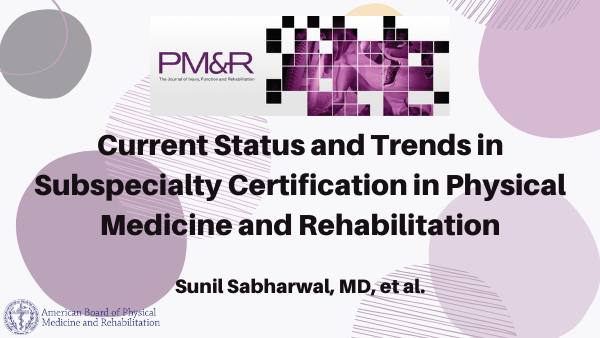Subspecialty Certification Research
Pediatric Rehabilitation Medicine Practice Analysis Completed

Pediatric Rehabilitation Medicine Examination Outline American Board of Physical Medicine and Rehabilitation Results Used to Create New Content Outline for 2023 PRM Exam
The American Board of Physician Medicine and Rehabilitation (ABPMR) follows industry standards and practices to update and maintain examination content outlines. In 2023, a job analysis (also known as a practice analysis or job task analysis) was completed to update the Pediatric Rehabilitation Medicine (PRM) Examination content outline. The process for developing the outline and information about the resulting outline and content weights are described below.
Job Analysis
A diverse group of subject matter experts, representing various practice settings and demographic characteristics, gathered to discuss and develop a description of the scope of practice of PRM. The group identified competencies (knowledge, skills, and abilities) required to perform the role of a PRM practitioner successfully. The resulting competencies were included on a survey that asked physicians to rate the frequency and importance of knowledge and tasks statements (e.g., frequency of performing botulinum toxin injections or importance of in-depth knowledge about cerebral palsy). The survey was sent to all physicians Board-certified in PRM (N = 321) and the response rate was 61.1%.
The survey results were used to make decisions about inclusion and exclusion of competencies on the PRM content outline and assisted in determining topic weights. Knowledge areas that were rated as highly important and frequently encountered as a PRM physician were weighted more heavily than knowledge areas that were rated as less important and/or less frequently encountered.
Examination Format
The ABPMR uses single-best-answer multiple-choice questions on all examinations. The PRM Examination contains 280 questions, of which a subset of questions are pretest and do not count for the current administration. Pretesting, gathering data and performance metrics on questions before they are used for scoring, is important for validity measures of future examinations.
Examinations are developed using the knowledge areas and weights determined by the job analysis. Content outline specifications inform the relative distribution of content on any exam form and detail topics that may appear.
The knowledge areas determine the content outline, but candidates should be prepared to respond to multiple tasks associated with each node on the content outline. Tasks include:
-
Perform a history and physical exam
-
Order or interpret the results of diagnostic studies to assist rehabilitative care of patients
-
Determine diagnoses (primary or secondary) and etiology
-
Identify risk factors
-
Establish prognoses
-
Prescribe and oversee therapy
-
Perform procedures (hands-on participation)
-
Evaluate or oversee care programs
-
Prescribe durable medical equipment and technology
-
Advocate relating to community integration
-
Manage ethical issues
-
Facilitate pediatric to adult transitional care
-
Provide rehabilitative care for adults with childhood-onset disability
-
Provide palliative care and hospice services
Content Outline and Weights


Examination Development and Administration
Each examination question is carefully reviewed by item writers, senior reviewers, and members of the PRM Examination Committee to ensure that they are current and relevant to practice (included within a domain or subdomain in the content outline). The items are then reviewed as a complete form before the examination is administered. This is to ensure that the content outline is reflected by the examination form and topic areas are covered appropriately. The new PRM content outline will be used to develop the 2023 PRM Examination.

